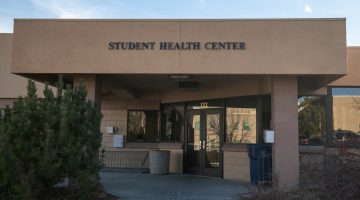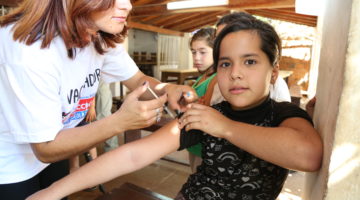
Student Health Center Campus Pharmacy as it stands in Sunday, March 31. The Student Health Center administered around 1,900 vaccines during fall semester.
In efforts to combat flu outbreaks, the University of Nevada, Reno holds flu shot clinics to help students stay healthy during the fall semester.
“We did 136 [at the last clinic], which is great,” said UNR’s Student Health Center (SHC) Nurse Supervisor Joanne McGee. “We’ve done about 1,900 already.”
October marked the start of flu season, which ten percent of the United States will suffer from annually, according to the World Health Organization (WHO). The WHO has also determined that the flu kills between 250,000 to 500,000 people each year.
The flu spreads quickly and is a droplet virus, meaning it spreads through coughing, sneezing and simply breathing in close proximity.
The SHC does around 130 shots per clinic, but can do up to 500 in one day at the center.
“People are maybe coming sooner to us, but we are doing really well,” said McGee.
According to the CDC, the flu is common during the fall and winter months.
Flu activity begins in October and peaks between December and February, sometimes lasting as long as May.
“I think last year I might’ve given the whole season 2,200 [shots],” McGee said.
By the third week of October, the SHC had given up to 2,500 flu shots to students and exceeded last year’s amount.
The flu vaccinations at the SHC are free, making them more accessible to students. The SHC covers the costs because they want to see more students immunized to better equip them for the campus illnesses that have already invaded this 2019 fall semester.
Not all students share the same enthusiasm about the shots this flu season. Some students, like freshman Trevor Paez share doubts about the effectiveness of the shot, as well as worry about the effects after the flu shot.
“I’ve been sick three times, twice with the stomach flu and once coming into school because of the flu shot,” Paez said.
Paez was initially optimistic about the flu shot, saying that the first time he received one it worked. After prompting from his mom to get another one before the start of school, he received it again, getting sick instantly.
“I got the flu—it was pretty crappy… I was throwing up,” said Paez. “It lasted a week and a half.”
The National Foundation of Infectious Diseases reports that college students will experience eight more days of illness if they get the flu.
When students mistrust the shot, it’s harder for the SHC to meet their immunization goal. Students also don’t feel like they really need it, or the rumored abrupt sickness after the shot turns them away.
“I would probably never get it again,” said Paez.
While the SHC has increased their number of flu shots given to students, the NFID reports vaccination rates on college campuses remain low, hovering between eight and 39 percent.
In their 2017-2018 influenza effectiveness report, the CDC estimated that flu vaccines were only 38 percent effective, but medical professionals still recommend getting the shot.
“Don’t do them too early… it’s not going to last a year… the coverage, but what I’m seeing is it seems to decrease the time that you’re sick,” said McGee.
The Nevada Division of Public and Behavioral Health (DPBH) said that an annual flu vaccine is the best way to reduce the risk of getting sick.
The DPBH also offers healthy habits to help in everyday situations, especially in space confining dorms where students live in close proximity.
Overall, the university wants a healthy student body. The SHC encourages coming in for vaccines, even if a student is not sick.
Students can be infected one day before symptoms are seen. It can also take five to seven days after becoming sick to feel the flu. If a student has a weak immune system, the flu will increase the chances of being sick for a longer period of time.
If any concerns or questions arise about the flu, students should be directed towards their campus health center. UNR’s Student Health Center contact info: https://med.unr.edu/shc, Clinics/Patients (775) 784-1223.
Emilie Rodriguez can be reached at tkjohnson@nevada.unr.edu or on Twitter @NevadaSagebrush











